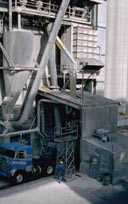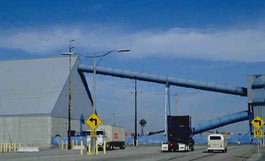TOO MANY CORPORATE COW PIES ON THE INDUSTRIAL FARM
How Mega-Corporations Exploit the Profit Potential of Our Food System
In the last Eco-Logical, we got a mouthful of the chaff that industrial farming
 has given us as it has produced its vast amounts of wheat, corn, and other "mono-crops." How did we go from lovable family farms to troublesome factory farms in half a century?
has given us as it has produced its vast amounts of wheat, corn, and other "mono-crops." How did we go from lovable family farms to troublesome factory farms in half a century?
It turns out there was big money to be made in industrial farming—but the big bucks were mostly for corporations, not for farmers. In part 2 of our guest-article series by Pesticide Action Network North America, we explore the rise of our corporatized farming system. The articles have been excerpted, with permission, from PANNA's Global Pesticide Campaigner, volume 13, number 2.
~ ~ ~
Industrial Agriculture and Corporate Power, pt 2
by Skip Spitzer, Pesticide Action Network North America
A key aspect of the industrial food system is that it is an outgrowth of a long and on-going process of economic concentration that allows the biggest agribusinesses—companies that supply the chemicals, seeds, equipment and services that are critical to industrial farms—to by and large define and control the modern food system. Today in the US, only 8% of farms account for 72% of sales. Worldwide, the top ten seed firms now control 30% of the $24.4 billion seed market, and the top ten agrochemical corporations control 84% of the $30 billion agrochemical market.
Concentration in the "input sectors" exposes farmers to artificially high costs for seeds, chemicals and other farming products, while concentration in commodities markets artificially lowers prices paid to farmers for their crops.
 As a result, small farms are disappearing. In the US, for example there were 5.4 million farms in 1950, but just over two million in 1997. Four-fifths of US agricultural subsidies now go to the top 30% of farms. The family farm crisis is also destroying rural communities. As local economies deteriorate, so do peoples' lives.
As a result, small farms are disappearing. In the US, for example there were 5.4 million farms in 1950, but just over two million in 1997. Four-fifths of US agricultural subsidies now go to the top 30% of farms. The family farm crisis is also destroying rural communities. As local economies deteriorate, so do peoples' lives.
In the Third World, agribusiness development and the opening of markets to large-scale, heavily subsidized foreign farm products is causing even more extensive displacement of small farmers.
The Next Big Phase in big agribusiness' quest for profits is to commercialize genetically engineered (GE) crops. The advent of GE crops has prompted new rounds of mergers and acquisitions of seed, agrochemical, and biotechnology companies. The top seven agricultural biotechnology companies are now also the top agrochemical corporations and rank among the top ten seed corporations.
Using new intellectual property rights, these companies are patenting "new forms of life" and licensing biotech seeds, rather than selling them. Licensing agreements typically outlaw the farmer's use and breeding of second-generation seeds and impose other requirements.
Thus, GE crops have deepened corporate control of food by accelerating economic concentration and by changing property rights around seeds. Meanwhile, instead of providing a promised "bullet train to the future," biotech seeds have at best provided mixed performance in terms of yield and pesticide use, while closing some export markets to US products, contaminating non-GE crops, creating uncertainties over liability, accelerating the emergence of herbicide-resistant weeds, and causing insect resistant to Bt bio-pesticides, which are essential tools for organic farmers.
 While it's tempting to think that large, high-tech industrial farms would be the most efficient way to produce food, small farms are extremely productive when considering total output rather than how much of a single crop can be produced. For instance, one study found the value of crops coming off an average 27-acre farm to be 10 times that of farms in the 6,000- to 7,000-acre range. As the problems of industrial farming become clearer, farmers and researchers in many countries are building on the rich heritage of smaller traditional and indigenous farming systems and demonstrating the extraordinary potential of ecologically based agriculture.
While it's tempting to think that large, high-tech industrial farms would be the most efficient way to produce food, small farms are extremely productive when considering total output rather than how much of a single crop can be produced. For instance, one study found the value of crops coming off an average 27-acre farm to be 10 times that of farms in the 6,000- to 7,000-acre range. As the problems of industrial farming become clearer, farmers and researchers in many countries are building on the rich heritage of smaller traditional and indigenous farming systems and demonstrating the extraordinary potential of ecologically based agriculture.
But even so, today we are still seeing:
- a growth in the number and size of corporations that trade internationally or operate in more than one country,
- a rising commitment to liberal trade policies by national governments, and
- further development of global institutions such as the International Monetary Fund (IMF), the World Bank, and the World Trade Organization (WTO).
The IMF and the World Bank broadly benefit corporations, principally by requiring recipient nations to reduce trade regulations and tariffs, reduce limits on foreign ownership and privatization, and promote export-led growth. The World Bank also provides transnational and large domestic corporations with lucrative contracts, investment loans and guarantees, access to resources, technical assistance, and advisory programs. World Bank projects in agriculture overwhelmingly foster the industrial model.
Even more far-reaching is the growing impact of trade and investment agreements, such as:
- the North American Free Trade Agreement (NAFTA),
- Asia-Pacific Economic Cooperation,
- the Free Trade Area of the Americas, and
- in particular, those of the WTO.
All of these trade arrangements are codifying new corporate rights. The WTO, for example, negotiates, interprets, and enforces global trade and investment agreements that raise commercial interests above governments' rights to set their own policies relating to trade, regulation, investment, purchasing, and other areas, regardless of social or environmental considerations. For example, the WTO Agreement on Agriculture removes barriers to agricultural markets, generally favoring industrial exporters (and their methods of production). Not surprisingly, huge, market-distorting agribusinesses themselves are not seen as barriers to free markets.
| Pesticide Action Network North America is the North America component of the broader Pesticide Action Network, a network of over 600 participating nongovernmental organizations, institutions and individuals in over 60 countries working to replace the use of hazardous pesticides with ecologically sound alternatives. |
|
End of Part 2
~ ~ ~
Well, it's no surprise that it turns out there are serious profit motives underlying the corporate-driven shift to industrial agriculture, and it's also no surprise that not everyone has come out a winner even as multi-billion-dollar agribusiness corporations have risen to power. It's distressing, though, that our governments seems happy to assist in the corporate takeover of national sovereignty and family farms.
This segment of our article series hinted at the negative aspects of corporatized farming from the perspective of farmers and farm workers. We'll cover more on that in the next Eco-Logical, as well as some info about how corporate farming isn't so good for the rest of us either. Ack!
Other parts in this series: pt 1 | pt 2 | pt 3 | pt 4
Get Grinning Planet free via email
|


